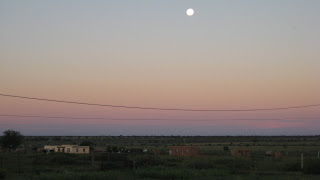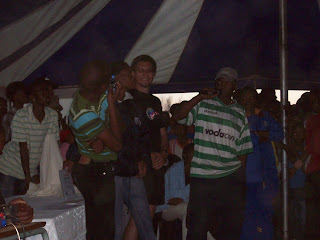A typical day for me begins slightly before sunrise around 6 am. At that time the birds begin to sing, the donkeys bray, the cocks crow, the dogs bark and I turn over in my bed, especially when it's cold (freezing.. remember I have no heater, stone walls and a zinc roof don't do much against the cold/heat) . Fortunately, we only have dogs. The other animals I can hear in the distance.
Usually I get up, make breakfast and check my
gmail and the New York Times on my phone, bathe, brush teeth, change, shave and head to work. I throw in playing with the dogs at one point in time as it would be hard to ignore them, they are super energetic and always ready to play and fight over my attention. If necessary, I'll do some polishing of my shoes and cleaning up before school as well.
I work at two primary schools (for the most part), so depending on where I am headed for the day, I either walk along the road until I can catch a ride with a taxi (minibus) or walk 10 minutes to my closer school. The other school is about a 50 minute walk away, which is doable, but I prefer not to arrive dusty to school.
This morning I was walking to my close school when I heard something odd. A metallic clang. Followed by another. And another. As I drew nearer to the school, a man was taking bricks that had been laid in the yard to prevent erosion and throwing them into a donkey cart. Odd. I supposed that the bricks were needed for something else.
I noticed my host mother, also a teacher at my school, standing outside the gate. The gate was locked. She explained that man who was now throwing rocks into his donkey cart had locked it and that there was not something right with him. Teachers who had already arrived had taken their classes into the classrooms, but one class was still waiting outside for their teacher. I took another look at the man.

Two more teachers approached the locked gate. Looking at the man with annoyance... and a bit of fear. It is well known in the community that the man is prone to madness, but to a large degree it is tolerated. It is viewed as shameful to send a family member away for treatment or schooling, so though we had known about this man before, we had just had harmless incidents.
I asked the teachers if it would be acceptable to call the police, as this man had rocks, was mad, and was near children. They responded affirmatively and I dialed the police and handed the phone to one of them. The children outside the classroom bothered me. I looped around the buildings and beckoned the children to follow. Once we were on the other side of the buildings we sang a lively few rounds of "Head, Shoulders, Knees and Toes" until I checked and saw that the man was now building a barricade with the stones in the road. This meant that the children could go back to class and lock the door, which is what all the teachers ended up doing. I decided to call the police again as they had previously told the teachers that there were no police cars available. This time they assured me there was one on its way.
The man blockaded the road with his
donkeycart for a bit and after stopping a few cars, decided he needed more bricks, so he came back into the yard. My principal then called the police. The head of the
SGB (School Governing Body, like PTA, but with more power) was now trying to get to the school, but had his progress hampered by the man.
I decided to continue working, but to keep listening in case I was needed. I followed up with one of the teachers I had been working with and she asked me if I could review verbs with the third graders. So a game very similar to Simon says evolved, which then led to the hokey-
pokey. Then it was time for them to write a test, so I left and saw that the police had arrived. They were driving off with the man... but his donkey cart was still in the yard. Though very tempted to take a joy-ride, I continued with my work.
At break-time, two of teachers asked me if I would kindly help them bring truant learners back to class. The learners had decided that attending school for half a day was enough and that they wanted to spend the rest of the school day outside playing a game involving coins. As they saw me approaching, they ran. The teachers and I then met to see what options were open to us. They had already contacted the parents previously, had the learners write a contract, and didn't know where to go from there, so we went through a few options in the school's
disciplinary policy, including calling the police to the school a second time. We decided to give them a written warning, warning them that they could be expelled.
The day went on. I helped the adminstrative assistant complete some database work and then helped some teachers with subject knowledge. Then, shortly before school let out, five learners were escorted into the office. Some of them obviously terrified. The head of the
SGB had been walking through the village and stumbled across the errant learners hiding in a
donga or gully. They were in trouble and they knew it.
Luckily for us, the principal had already printed out the letters and we had already discussed what we were going to do. The children received quite the verbal haranguing.
Then after-school I hosted had a professional development workshop on Mentoring and Coaching which had been requested by the principal.
Eish, what a day.









































